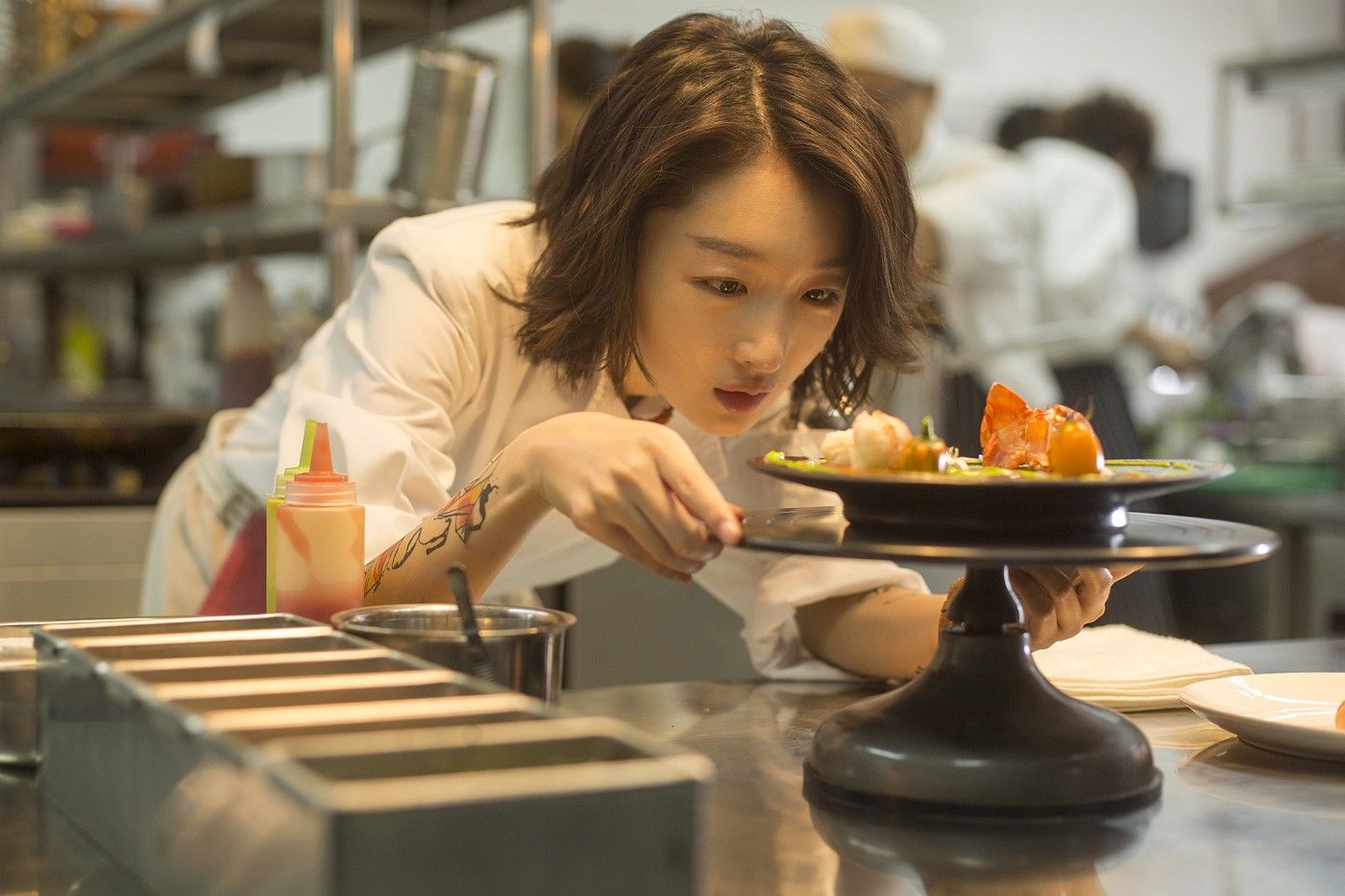This Is Not What I Expected (Derek Hui, 2017)

One of two romantic comedies that tried and failed to unseat the powerhouse Fast & the Furious 8 at the Chinese box office this past May Day weekend, This Is Not What I Expected opens here on Friday, a week after its counterpart Love Off the Cuff. It’s a totally pleasant film that surfs gently on the charm of its lead actors, recalling at times the softer screwballs of the 1930s, or more exactly the modern imitations of those classics. It’s essentially You’ve Got Mail, but where the two leads secretly communicate not via letters or emails, but through food. Zhou Dongyu, who was exceptional last year in Derek Tsang’s SoulMate, plays a manic pixie who repeatedly runs afoul of aloof billionaire Kaneshiro Takeshi (aging nicely more than 20 years after Chungking Express and Fallen Angels). Kaneshiro is a fastidious foodie, a buyer and seller of hotels who checks into an aging inn somewhere in Shanghai and finds all of the food lacking. Except, that is, for a soup made by Zhou, known to Kaneshiro only as the woman who mistakenly vandalized his truck in an act of revenge for her roommate. Kaneshiro and the chef refuse to meet each other, instead using the peculiar qualities of food to bond.
During his stay at the hotel, the two continue to run into each other in a series of semi-slapstick sequences (Zhou drunkenly falls from a roof and reassembles herself with a sickening zombieness, the germaphobe Kaneshiro then stuffs her into a suitcase and leaves her in the hallway to get rid of her, which leads to his spending a night in jail). But eventually they figure each other out and Kaneshiro, obsessed by her food, practically moves into her apartment in an attempt to figure out what it is about it that’s so appealing to him. As you’d expect, they fall in love during a nightlong trip caused by accidentally eating hallucinogenic blowfish, but he doesn’t realize it until much later. Obstacles include the fact that Kaneshiro already has a personal chef (the mixing of the food and sex metaphor here becoming increasingly complicated, as the other chef suggests a kind of polyamorous division of meal responsibilities), and his father, played by none other than Taiwanese actor Chang Kuo-cho, who played the father in A Brighter Summer Day.
This is director Derek Hui’s debut feature, after a distinguished career as a film editor (Peter Chan’s Wuxia and Dearest, Teddy Chan’s Kung Fu Jungle, along with Man of Tai Chi, SoulMate, and more). Like SoulMate, it is also produced by Peter Chan, one of the key figures in Hong Kong cinema who seems to be recreating the spirit of his 1990s production house UFO on the Mainland, mixing in talent from Hong Kong (Hui), Taiwan (Kaneshiro & Chang), and China itself (Zhou). While the film is set in Shanghai and has some lovely images of the city’s skyline, it doesn’t really feel specific to any one place, a major drawback of most mainstream Mainland productions, which feel like they could take place anywhere, or nowhere, a vagueness of location that is the polar opposite of Chan’s seminal 90s works like Comrades, Almost a Love Story or He Ain’t Heavy, He’s My Father. Hui makes up for this though with his cooking and eating sequences, which put televised food porn to shame with their attention not just to color and texture, but the sounds of cooking. Unlike classic Hong Kong food comedies like Stephen Chow’s God of Cookery or Tsui Hark’s The Chinese Feast, the food here is solidly realistic, it is actual food that could be cooked and eaten, and it’s so gorgeous that it isn’t hard to understand how it could change a person’s life. Hui throughout uses a lot of shallow focus, centering his images on his actors’ faces and giving the film the crisp brightness of color that so distinguishes contemporary Chinese film from its blander Hollywood counterparts. Kaneshiro is excellent as usual, the opposite of his depressingly manic mess of a performance in last year’s Wong Kar-wai produced See You Tomorrow. As the straight man to Zhou’s adorable flightiness, it’s the best work I’ve seen from him since 2011’s Wuxia. After her terrific dramatic work in SoulMate, it nice to see Zhou in looser, lighter fare. her work is as charming as that of Bai Baihe in Go Away Mr. Tumor or Jelly Lin in The Mermaid or Angelababy in See You Tomorrow. After years of false starts (I’m looking at you Sophie’s Revenge and My Lucky Star), it looks like China might finally be developing both an exceptional group of comediennes and the kind of projects commensurate with their talent.
